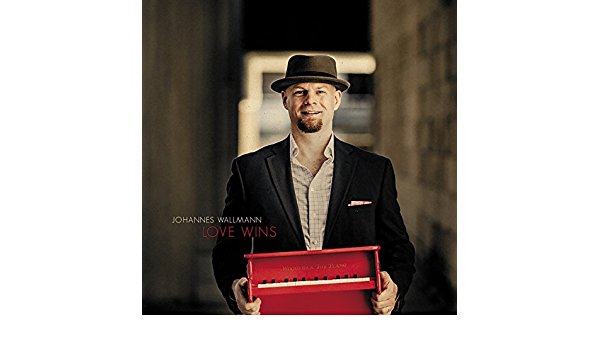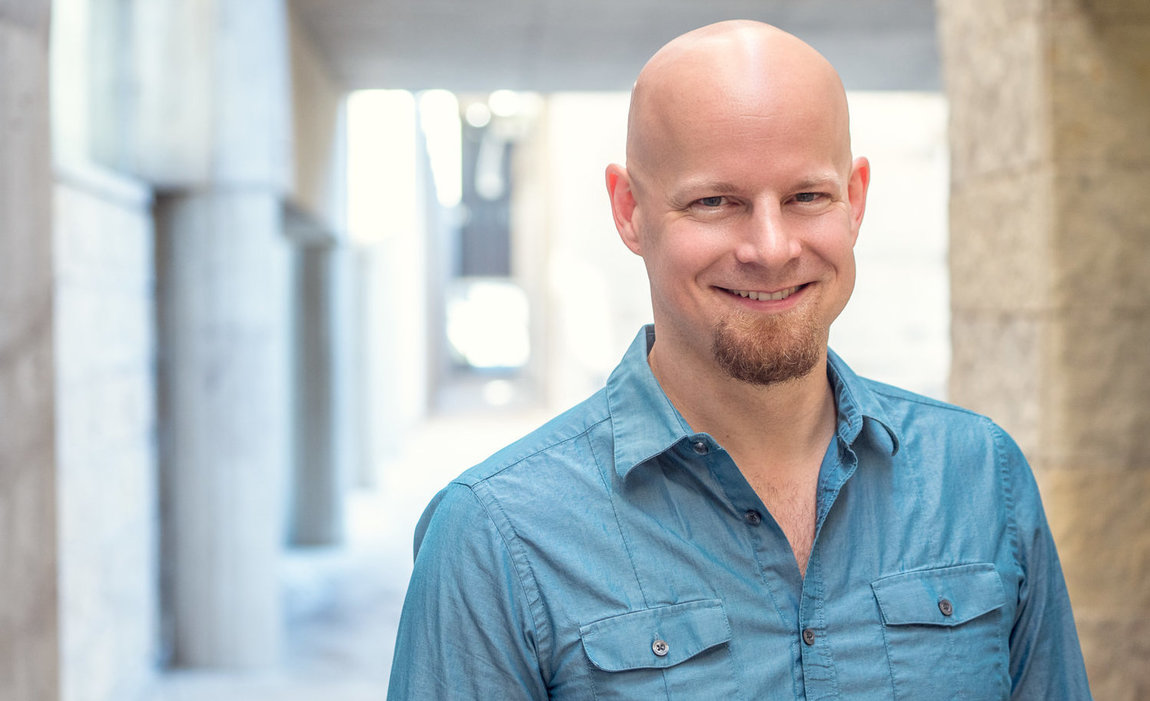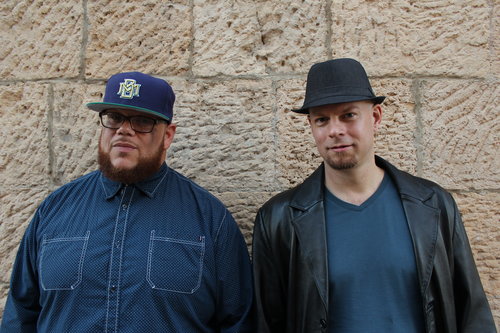
Album cover for Johannes Wallmann’s “Love Wins.”
Johannes Wallmann will present a CD-release concert in support of Love Wins (Fresh Sound/New Talent) at 8 p.m. Friday, May 11 at The Jazz Estate, 2423 N. Murray Ave., Milwaukee. Phone 414-964-9923, info@jazzestate.com. The group will include Wallman, piano; Rob Dz, spoken word/rap; Russ Johnson, trumpet; John Christensen, bass; and Mitch Shiner, drums.
“Love is unmotivated respect: all of which testified not to a peevish Lord who was His own love but one who enabled human love. Not for his own glory – never. God loved the way humans loved one another; loved the way humans loved themselves; loved the genius on the cross who managed to do both and die knowing it.” – Toni Morrison, from her novel Paradise. 1
Johannes Wallmann is a musician worth caring about for reasons more than his artistry. I, for one, wish more jazz musicians today found socially-relevant topics to set their music to, or be inspired by.
Not that it’s something required, in any PC sense. But the Madison-based pianist and composer has created a fabulous new album that happens to explore and assert equality in marriage. It also flows directly from the challenges of Wallmann’s own life and his dedication, and love (and don’t shortchange that too-oft dismissed or debased concept), as well as his uphill and, yes, inspiring successes.
I can think of few recordings in recent memory where the music and lyrics prove as passionate, engaging and thoughtful as Love Wins. And few so closely entwine the musician’s creative strivings with each human’s worthiness of equality and respect, as this nation purports to profess.

Max Wendt Photography
Pianist-composer Johnannes Wallmann. Courtesy Wisconsin Union UW-Madison
Walllmann is gay, and his husband, Keith Borden, and he were two of the plaintiffs in the ACLU lawsuit challenging Wisconsin’s ban on sax-sex marriage (they had gotten married in Canada, where such marriage was legal). Wallmann couldn’t attend the August 2014 oral arguments before Judge Richard Posner and two other members of the Seventh Circuit Court of Appeals.
When in 2012 Wallmann and Borden moved from California to Wisconsin for Wallmann to lead the jazz studies program at the University of Wisconsin, the couple had been together for 15 years. They had been legally married for five years. However, the State of Wisconsin did not recognize their marriage.
A month later Posner wrote the ruling that upheld an earlier federal court decision striking down Wisconsin’s same-sex marriage ban. In June 2015, the Supreme Court legalized gay marriage across the U.S.

Johannes Wallmann with his husband Keith Borden. Courtesy Isthmus newspaper
“I thought there had to be something in there that could make an interesting composition,” Wallmann told Jane Burns for Isthmus newspaper.
The ruling’s results are “love wins” – not a formal legal decree but what it meant most to Wallman and Borden. It sure as hell inspired Wallmann, and he corralled a gifted group of musicians to broaden his aural canvas. His most notable collaborator is Madison hip-hop rapper/lyricist Rob Dz. “He’s absolutely world-class as an improvisor,” says Wallmann of Dz. “There are few people in the world who can do what he can do — freestyle rapping in a jazz setting where he’s able to respond to what’s going on in the music.”
Wallman feels the moment is ripe for such a statement: “It’s a good time for it. We seem to be taking a lot of steps backward and we need to remember to celebrate when we have successes and acknowledge that.”
Still, the recorded celebration grows thematically as a suite, and is not without a clear aspect of drama. The album opens with the philosophically declamatory “Equality!”, and the next three tracks are “Preamble,” “Love Wins,” and “We (reach for) Love.”
Then, the fulcrum of the 10-track album arrives – the fifth cut, titled “The Seventh Circuit” – in which Wallmann deftly samples into the tune portions of the actual lawyers’ oral arguments from the court proceedings. So it’s legal and social history literally documented, and enhanced.
“Equality!” opens the album with a hip-shakin’ boogaloo ensemble line, conveying the power of collective momentum and mutability for a greater good. It also suggests dance as an underestimated human rhythmic force. “Hatred is seen as a frivolity,” Dz notes, then posits: “Why can’t we all find a way to just be us, from the rights of Stonewall to those refusing to give up seats on the bus/ to those seeking to open up the door to equality?” The ensemble lines follow, tight, tough and harmonically pungent.
By contrast, the instrumental “Preamble” sets a more uplifting, expansive tone with the horns casting musical questions in the air like a skywriter, with trumpeter Johnson especially soaring.
The title track “Love Wins,” ensues, resurrecting the modal celebratory vamping of some 1960s jazz. Interwoven with instrumental solos and buoyant refrains by vocalist Sharon Clark is an eloquent and wise meditation on love, by Dz: Love is patient, love is kind, love is a spiritual connection/ There is no true definition, love is what brings life to fruition/ love is designed to be a disposition…who are we to try and box it in, or micromanage love?…Now imagine a world without love/ when the very fabric of our existence as been disposed of?…All love wants to do is live free, as the basis of equality./ It’s a right to love for every American – white, brown, yellow, red…”
“We (Search for Love)” sounds like the force of love’s inexorable will. “We will, we will love!” Dz asserts defiantly. Wallmann uses synthesizer with a swirling muscularity to lift the tune to a powerful climax.
“The Seventh Circuit” aptly bristles with contrapuntal lines – trumpet, tenor and baritone saxes, guitar and Devin Drobka’s crackling drums – that swing and stomp. Johnson’s trumpet absolutely shines, as a rights-of-humanity beacon over troubled waters. And then the sampled lawyer comments arise. Finally, Rob Dz drops into the discussion, like an avenger for love, a brilliant stroke.
“Can I Know (More Love)?” belongs to veteran Madison singer Jan Wheaton, recalling Carmen McRae tempered by Shirley Horn, and offers a limpid respite from the hurly-burly. It’s the calm before a spirit storm.
“Stonewall was a Riot” functions on at least two levels. It refers to the 1969 “Stonewall rebellion,” an historic series of spontaneous protests by gays in Greenwich Village that gave birth, in a loud outcrying, to the gay liberation movement. The music of “Stonewall” is pure swinging, righteousness – evoking John Coltrane’s “Resolution,” from his classic album A Love Supreme, perhaps the most celebrated and powerful testimony on the subject in jazz history. So Wallmann’s music feels inevitable here, an homage, but steely-willed rather than reverent.
The closing tunes borrow from Cannonball Adderley-style soul jazz and, finally, more beautiful writing, singing and playing –- in sum, a spirit-empowering affirmation of love as an uplifting, elusive and functional force in life.
Wallmann has played increasingly in Milwaukee as a sideman for trumpeters Brian Lynch and Russ Johnson, who is now returning the favor, and for vocalist Jackie Allen. But he’s clearly one of the premier jazz talents in the upper Midwest, not only given that he is director of UW Madison’s jazz studies program. He’s toured the U.S., Europe and Asia, and performed or recorded with trumpeters Lynch, Ingrid Jensen and Ralph Alessi; saxophonists Gary Bartz, Seamus Blake, Dennis Mitchelltree, and Pete Yellin; bassist Matt Penman, drummers Jeff Hirschfield and Danny Gottlieb; tubaist Howard Johnson, and singers Kevin Mahogany and Donald Bailey, among others.

Johannes Wallmann (right) with hip-hop word artist Rob Dz. Photo by Keith Borden, courtesy Insmus.com
Rob Dz has contributed mightily, in his comparatively soft-spoken manner, to recordings and performances by the excellent politically-minded jazz group Chicago Yestet, and he works weekly with a Madison-based band, New Breed Trio.
In fact, he’s the rapper for those who struggle with more braggadocious and off-color hip-hop. That ain’t for a second to say he’s not a serious truth-dealer, even important, and yes, cool.
Dz is also a thoughtful historian of his chosen art form, with a dry sense of humor. I recall his fine presentation on hip-hip and rap when he spoke at a cultural journalism class I taught at Edgewood College in Madison a number of years ago. At one point, one of my students asked him what his favorite kind of music was.
“Silence,” he answered, without losing a beat. Though doubtless tongue-in-cheek, that solitary word spoke volumes from his sly, reflective side.
Dz, Wallmann & Company show that Love Wins won’t remain silent, even as it stands on the most easily derided of human values. Acclaimed, and sometimes acerbic author and essayist Martin Amis identifies love as the essential quality in Saul Bellow’s work, in arguing for him as perhaps America’s greatest novelist. “Love has always been celebrated for, among other things, its transformative powers; and it is with love, in concert with his overpowering need to commemorate and preserve (‘I am the nemesis of the would-be-forgotten.’) that Bellow transforms the world.” 2
Johannes Wallmann here seems to do that, with both the jazz tradition and human equality in life and marriage. In his telling, love takes on all comers, and transforms the world. As did “the genius on the cross,” whom Toni Morrison aptly describes as a black man: “See? His woolly head alternately rising on his neck and falling toward his chest, the glow of his midnight skin dimmed by dust, streaked by gall, fouled by spit and urine…This execution made it possible to respect – freely, not in fear – oneself and one another.” 3
________
1.Toni Morrison, passage from Paradise quoted in The Origin of Others, Harvard University Press, 2017, 70-71
2. Martin Amis, The Rub of Time, Nabokov, Bellow, Hitchens, Travolta, Trump: Essays and Reportage, 1994-2017, Knopf, 2018, 26
3. Morrison, from Paradise quoted in The Origin of Others, 71-72
For more information, visit: http://www.johanneswallmann.com


Wonderful story, Kevin!
Janica, thanks!. nice to hear from you. Hope you’re doing well,
Kevin
Hi Kevin, Sounds like an intersinting album, if he would listen to it Dillon might appreciate it too.
AS good as the record is, musically and lyrically i don’t want impose my taste on him. So if he reads the review and indicates he’s interested in it, I’ll send him a copy.
thx,
K